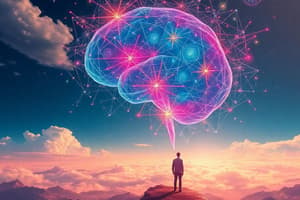Podcast
Questions and Answers
What are the three types of memory?
What are the three types of memory?
- Working, Implicit, Explicit
- Sensory, Short-term, Long-term (correct)
- Immediate, Delayed, Rehearsal
- Episodic, Semantic, Procedural
Sensory memory is also known as working memory.
Sensory memory is also known as working memory.
True (A)
What is the difference between episodic and semantic memory?
What is the difference between episodic and semantic memory?
Episodic memory is the serial memory of events, while semantic memory is the structured memory of facts, concepts, and skills.
Name the two types of interference that can affect long-term memory.
Name the two types of interference that can affect long-term memory.
What is a characteristic of skilled activity in skill acquisition?
What is a characteristic of skilled activity in skill acquisition?
Match the following theories of emotion with their descriptions:
Match the following theories of emotion with their descriptions:
The two types of errors in skill acquisition are __ and __.
The two types of errors in skill acquisition are __ and __.
What role does emotion play in problem-solving?
What role does emotion play in problem-solving?
Flashcards are hidden until you start studying
Study Notes
Information Stored in Memory
- Memory types include sensory, short-term, and long-term memory.
Sensory Memory
- Also referred to as working memory; acts as a buffer for incoming sensory stimuli.
- Types of sensory memory:
- Iconic memory: captures visual stimuli.
- Echoic memory: captures auditory stimuli.
- Haptic memory: relates to tactile sensations.
Short-Term Memory
- Functions as a scratch pad for temporary recall of information.
- Access time is rapid, approximately 70 milliseconds.
- Information decays quickly, around 200 milliseconds.
Long-Term Memory (LTM)
- Serves as a repository for all knowledge.
- Access and decay are slow compared to shorter memory types.
- Has enormous, virtually unlimited capacity.
Types of Long-Term Memory
- Episodic Memory: chronological memory of personal experiences and events.
- Semantic Memory: structured memory of facts, concepts, and skills derived from episodic memory.
Semantic Memory Structure
- Provides access to information and represents relationships among data.
- Supports inference, allowing conclusions based on evidence and reasoning.
Model of Semantic Network
- Child nodes inherit properties from parent nodes.
- Explicit and precise relationships between information facilitate inference through inheritance.
Models of Long-Term Memory
- Frames: Organizes information in data structures with slots instantiated with specific values.
- Scripts: Models typical information necessary for interpreting contexts, adaptable with contextual values.
- Production Rules: Reflect procedural knowledge with condition/action rules guiding behavior based on given conditions.
Storage and Retrieval in Long-Term Memory
- Rehearsal: Critical for moving information from short-term memory to long-term memory.
- Total time hypothesis: Retention is proportional to rehearsal time, promoting efficient learning through distributed practice.
- Forgetting mechanisms:
- Decay: Gradual loss of information over time.
- Interference: New information (retroactive) or old misinformation (proactive) can disrupt recall.
Retrieval Processes
- Recall: Reproducing information from memory, aided by cues like categories or imagery.
- Recognition: Identifying previously encountered information, which is generally simpler than recall.
Information Processing and Application
- Key areas include reasoning, problem-solving, skill acquisition, and error identification.
Reasoning
- Deductive Reasoning: Drawing necessary conclusions from premises; where truth and logical validity may conflict.
- Inductive Reasoning: Generalizing from observed cases to unobserved instances with possible assumptions.
- Abductive Reasoning: Inferring causes from events, sometimes leading to incorrect explanations.
Problem-Solving
- Involves finding solutions to novel tasks using existing knowledge.
- Gestalt Theory: Emphasizes productive and reproductive processes in problem-solving, although lacks extensive evidence.
- Problem Space Theory: Involves generating states using valid operators within human information processing architecture.
Skill Acquisition
- Characterized by "chunking," allowing for effective categorization of information.
- Involves deeper, conceptual organization rather than superficial grouping.
Errors
- Slips: Occur with the right intention but improper execution, often resulting from poor physical skills.
- Mistakes: Result from incorrect intentions or misinterpretations, causing misunderstandings.
Emotion
- Involves cognitive and physical responses to stimuli, integrating affect as a biological reaction.
- Positive affect enhances creativity in problem-solving; negative affect can impair task performance.
- Donald Norman observes that negative emotions complicate even simple tasks, whereas positive emotions facilitate challenging ones.
Theories of Emotion
- James-Lange Theory: Emotions arise from interpreting physiological responses to stimuli.
- Cannon Theory: Emotions result from physiological responses triggered by stimuli.
- Schacter-Singer Theory: Emotion results from evaluating physiological responses in the context of the surrounding situation.
Studying That Suits You
Use AI to generate personalized quizzes and flashcards to suit your learning preferences.




